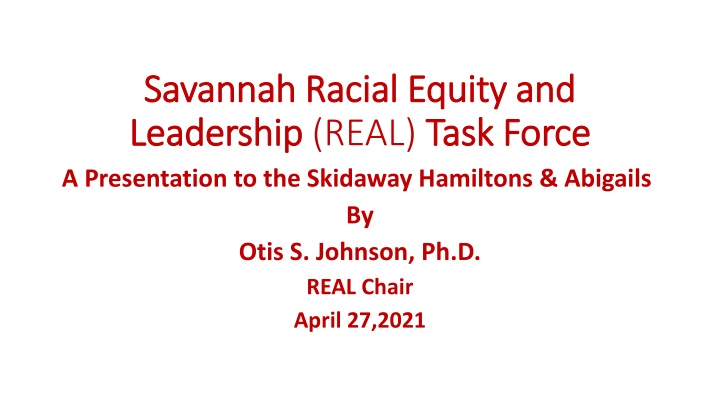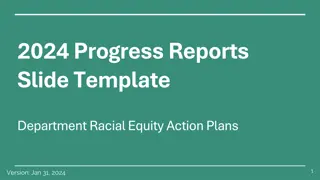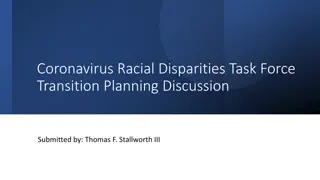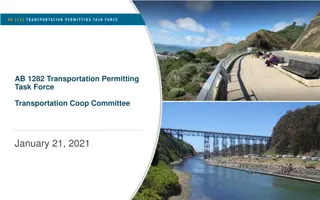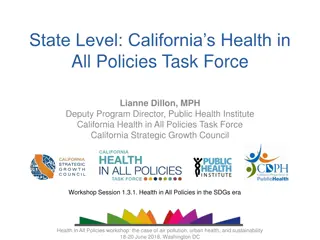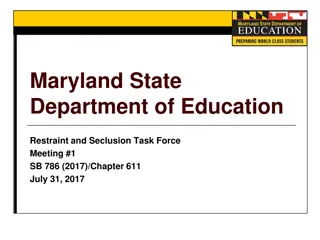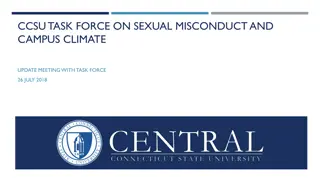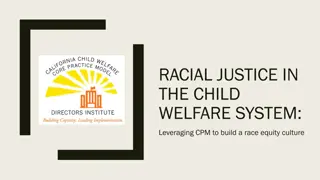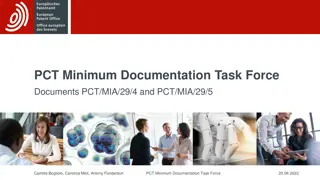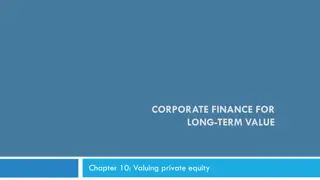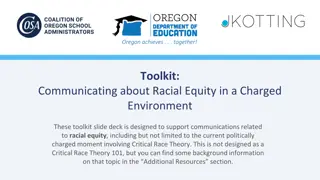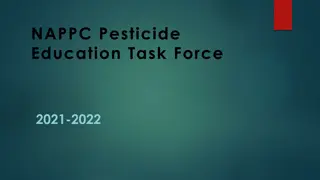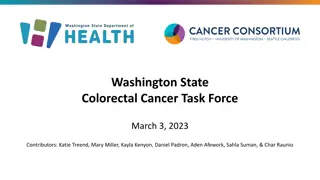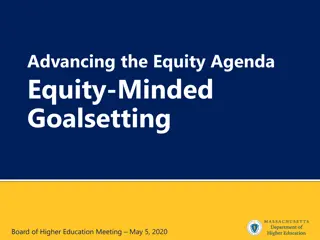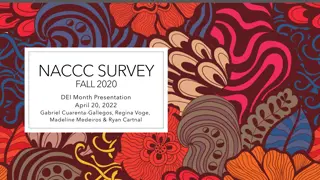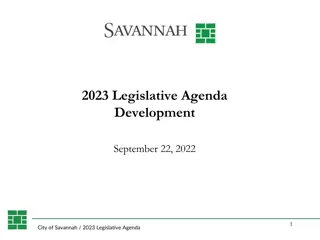Savannah Racial Equity and Leadership (REAL) Task Force
This presentation by Dr. Otis S. Johnson, Chair of the REAL Task Force, delves into the purpose and goals of the Savannah Racial Equity and Leadership Task Force. The task force aims to advance racial justice, improve the lives of people of color, and create a more equitable society in Savannah, Georgia. Through data analysis and community action planning, they seek to address racial disparities and promote systemic changes for the benefit of marginalized communities.
Download Presentation

Please find below an Image/Link to download the presentation.
The content on the website is provided AS IS for your information and personal use only. It may not be sold, licensed, or shared on other websites without obtaining consent from the author.If you encounter any issues during the download, it is possible that the publisher has removed the file from their server.
You are allowed to download the files provided on this website for personal or commercial use, subject to the condition that they are used lawfully. All files are the property of their respective owners.
The content on the website is provided AS IS for your information and personal use only. It may not be sold, licensed, or shared on other websites without obtaining consent from the author.
E N D
Presentation Transcript
Savannah Racial Equity and Savannah Racial Equity and Leadership Leadership (REAL) Task Force A Presentation to the Skidaway Hamiltons & Abigails By Otis S. Johnson, Ph.D. REAL Chair April 27,2021 Task Force
Equity and Racial Equity Equity and Racial Equity Equity Just and fair inclusion. An equitable society is one in which all can participate and prosper. The goals of equity must be to create conditions that allow all to reach their full potential. In short, equity creates a path from hope to change. Racial Equity In a racially equitable society, the distribution of society s benefits and burdens would not be skewed by race. In other words, racial equity would be a reality in which a person is no more or less likely to experience society s benefits or burdens just because of the color of their skin. Source: Partnership for Southern Equity
Savannah Racial Equity and Leadership Taskforce Savannah Racial Equity and Leadership Taskforce (REAL) Purpose Purpose Develop a task force, sponsored by the Office of the Mayor of Savannah, Georgia, composed of representatives of the Savannah civic community, the private sector, and the public sector for the purpose of advancing racial justice and improving the lives of people of color. Created by the Mayor on, July 23, 2020. Forty-five (45) Members.
Purpose of REAL Purpose of REAL Develop a shared understanding of equity and why it matters to the work of the REALTask Force in Savannah. Examine the data and circumstances that perpetuate inequities. Learn the important role history plays in understanding the root causes of inequities.
Purpose of REAL Purpose of REAL The task force, with the assistance of a consultant, Partnership for Southern Equity (PSE), will develop an analysis of racial disparities in Savannah by using the concept of a racial equity lens to guide its work. This means examining critical sectors of the community (employment, health, housing, etc.) and analyzing the impact of race, class and gender on the well- being and opportunity structure for people of color in Savannah.
Purpose of REAL Purpose of REAL The task force, will develop a community action plan that will provide recommended systemic and structural changes that will reduce/remove barriers and increase equity for people of color. The plan will be presented to the Mayor and City Council and the community in August 2021. To develop a leadership cohort that become advocates for racial and environmental justice in Savannah, Georgia.
Purpose of REAL Purpose of REAL Participate with three (3) other place-based initiatives (Albany, Brunswick, Georgia Conference of the NAACP) funded by the Sapelo Foundation for the purpose of engaging in a collaborative effort to expand a statewide infrastructure to advance a more equitable and just Georgia.
Racial Equity and Leadership Taskforce Racial Equity and Leadership Taskforce Six (6) Issue Area Committees Education (Molly Lieberman, LOOP It Up Savannah & Dr. Gwendolyn Jordan, SSU) Criminal Justice (Lloyd Johnson (100 Foundation) Economic Empowerment and Wealth Building (Alecia Johnson, Step Up Savannah) Health (Tiffany Petillar, Epic Health Solutions) Housing ( Erina Tandy, SCAD) Environmental Justice (Dr. Mildred McClain, HarambeeHouse)
Data on Issue Areas Data on Issue Areas Education Public School Demographics: Black 57% White 28% Hispanic 7% Two or more races 5% Asian 2%
MAP Winter 2020 Grade 3 Reading MAP Winter 2020 Grade 3 Reading Total Low Low Avg Avg High Avg High # # % # % # % # % # % Asian 65 10 15% 9 14% 18 28% 11 17% 17 26% Black 1521 453 30% 343 23% 318 21% 274 18% 133 9% Hispanic 288 94 33% 52 18% 54 19% 52 18% 36 13% Multi-Racial White 150 648 23 82 15% 13% 18 86 12% 13% 38 121 19% 25% 39 178 27% 26% 32 181 28% 21%
MAP Winter 2020 Grade 3 Reading MAP Winter 2020 Grade 3 Reading Low Average High Black 30% 23% 9% White 13% 19% 28% Hispanic 33% 19% 13% Asian 15% 28% 26%
Student Discipline Student Discipline Of the 4,133 students suspended out of school in 2018 in Savannah Chatham County Public Schools, 76% of them were Black resulting in an average of 392 days missed from school, the highest 10% in the state. Black students were overwhelmingly represented: Suspension from bus (82.9%) Expulsion (50%) Removal from class (100%) Alternative school (87.8%) In-school suspension (81.5%) Source: DEEP Center (2020). Savannah: A Tale of Two Cities, p.9.
Data on Issue Areas Data on Issue Areas Criminal Justice The nature and extent of racial inequity in the criminal justice system is evidenced by the disproportionate number of Black males in the Chatham County Detention Center. Black males constitute 20% of the population of Chatham County. Blacks constitute 68% of the CCDC. Blacks constitute 76% of the jail s 900 inmates being held solely for possession of cannabis.
Data on Issue Areas Data on Issue Areas Juvenile Justice Consistently, 76% of the children going through the juvenile justice system in Chatham County are black. child Over the last four years, 35 of 36 children sent to Superior Court for prosecution as adults were Black. The other child was considered Other/Mixed. No white children were referred to Superior Court for sentencing during this same time period. Source: REAL TF Criminal Justice Committee.
Data on Issue Areas Data on Issue Areas Economic Empowerment and Wealth Building The median income of African Americans in Savannah ($31,184) is 58% less than their white counterpoints ($54,242). 25.6% of Savannah s families of color live in income poverty, this is Income below the federal poverty threshold. 38.6% of the people of color in Savannah are homeowners compared to their white counterparts of 50.8%. Savannah is 54% Black but only 40% of the businesses are minority owned. Source:Step Up Savannah.
Data on Issue Areas Data on Issue Areas Health In Savannah, 35,000 people live in areas without access to healthy foods. Although Africans American make up 54% of the total population, they make up about 60-80% of the individuals living In areas without healthy food access, leading to higher prevalence of Chronic conditions such as obesity, diabetes, and heart disease. 14.7% of the City of Savannah diagnosed with T2 Diabetes. 38% considered obese. 6.7% chronic heart condition and 38.8% have high blood pressure. Source: REAL TF Health Committee
Data on Issue Areas Data on Issue Areas Housing Rent burdens are high. Savannah has the second highest cost of rent in Georgia, leaving 55% of renters spending more than 30% of their household income on rent and utilities. This burden is compounded by wages that lag behind national averages by as much as 20%. (Sources: Harvard Joint Center for Housing Studies, 2019; Bureau of Labor Statistics, 2019.) Those earning 120% or less than the Average Median Income (AMI) in Savannah are cost burdened. (2021 CHSA Case for Support). People of color do not have equal access to mortgage loans. In 2019, 62% of mortgage applications submitted by Black residents of Chatham County were denied, compared to only 26% denied to white applicants. Only 1,160 Black households applied for mortgages, compared to 4,882 submitted by white households. (Source: FFIEC Home Mortgage Disclosure Act, 2019; Pew Research Center, 2017.)
Data on Issue Areas Data on Issue Areas Environmental Justice Savannah s lower-income frontline, fenceline and environmental justice communities tend to pay a higher percentage of their household income on energy than the State or National average due to living in sub-standard housing that is not energy efficient and that has extensive deferred maintenance, causing them to be more vulnerable to unintended negative economic impacts of Savannah s transition to clean renewable energy. A high incidence of childhood asthma has been identified in the of populations of predominately Black neighborhoods of Carver Heights, Hudson Hill, Woodville, and Greater West Savannah. (Children under 18: 20.4%)
